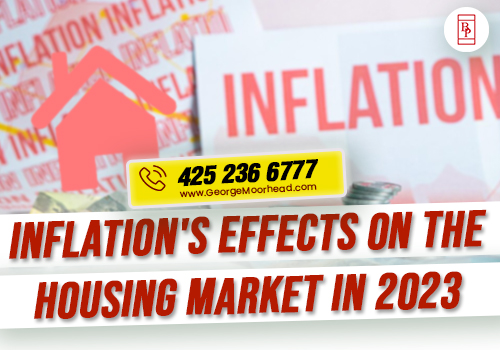Inflation's Effects on the Housing Market in 2023

Are you curious about what the real estate market has in store for 2023? With inflation on the rise, many are wondering how this will impact the industry in the years ahead. Looking ahead, several developments may influence prices ranging from rising interest rates to changing demographics.
In this article, we'll explore the latest real estate market predictions for 2023 and beyond. From inflation's impact on home prices and interest rates to the rising demand for sustainable and affordable housing, we'll examine the sector's most important trends and factors.
Whether you're a veteran professional or just starting out, this is a must-read if you want to keep ahead of the curve. So let's jump in and explore what the future may hold for the world of real estate.
Inflation And The Housing Market
Inflation and the housing market have a long and intertwined history. In the past, periods of high inflation have often led to rising home prices and increased mortgage rates. This was particularly true in the 1970s and early 1980s when inflation soared to double-digit levels. Which caused a sharp increase in home prices and made mortgages more expensive.
In 2023, inflation is once again on the rise, and many are wondering how it will affect the housing market.
While the relationship between inflation and the housing market is complex. It is generally agreed that rising inflation will lead to higher home prices and increased mortgage rates. Which can impact both housing demand and supply. Additionally, inflation can also have an impact on the rental market. As landlords may need to adjust their rents to keep up with inflationary pressures. Let's look at it deeper in the following sections.
-
Historical Context of Inflation's Effect on the Housing Market
During the 1990s, the US economy went through a time when inflation rates were between 1.1% and 4.1% per year. The US housing market changed a lot during this time of low inflation.
At the beginning of the decade, the was still recovering from the savings and loan crisis of the late 1980s. Home prices were depressed, and the market was sluggish. But as the decade went on, the US economy started to grow, and the housing market grew along with it. Low inflation rates helped keep mortgage rates low, making it easier for buyers to afford homes. As a result, housing demand increased, driving up property prices.
In the middle of the 1990s, the US housing market had a big boom. In many markets, home prices went up by more than 10% per year. Low inflation, low mortgage rates, and a strong economy all helped to fuel this boom. However, towards the end of the decade, the housing market began to cool off. As inflation began to rise slightly and mortgage rates began to climb.
Overall, there was a lot of growth and change in the US housing market in the 1990s. As the economy entered the 21st century, rising inflation at the end of the decade signaled what was to come.
-
Current State of Inflation in 2023
In 2023, the US economy is in a time of higher inflation, with the annual inflation rate staying around 6%. This rise in inflation is mostly due to a number of things, such as:
-
The recovery of the economy after the pandemic.
-
Problems in the supply chain.
-
Fiscal stimulus measures.
Higher inflation can increase home prices, which is one of the main effects it has on the housing market. This is because inflation can make the dollar less valuable, which makes it more expensive for people to buy homes. Also, rising inflation can cause mortgage rates to go up, which makes it harder for buyers to buy a house.
The way inflation is right now also has an effect on the rental market. As inflation goes up, landlords may have to raise rents to cover rising costs like property taxes, insurance, and repairs. This can make it harder for renters to afford a place to live, especially in places where rents are already high.
-
Impact of Inflation on Housing Demand and Supply
On the demand side, rising inflation can cause mortgage rates to go up, which can make it more expensive for people to buy a home. In turn, this can make fewer people want to buy a home, especially in markets where home prices are already high.
On the supply side, inflation can also change how new homes are built and developed. As inflation rises, the costs of building materials, labor, and other things needed to build a new home also rise. This can make it more expensive for builders to build new homes, which can reduce the number of Homes for Sale in Issaquah WA available.
-
Influence of Inflation on Home Prices and Mortgage Rates
Inflation has a direct impact on home prices and mortgage rates. As inflation increases, so does the cost of borrowing money, which leads to higher mortgage rates. Higher mortgage rates mean that buyers will have to pay more interest on their mortgage, which can make it more challenging for them to afford a home.
Furthermore, inflation can also drive up home prices by eroding the purchasing power of the US dollar. As the value of the dollar decreases, it takes more dollars to purchase the same amount of goods and services, including homes. This can lead to a decrease in housing affordability, particularly in markets where home prices are already high.
-
Effects of Inflation on the Rental Market
Inflation can also have a huge impact on the rental market. As inflation increases, landlords may need to adjust rents to keep up with rising costs, such as property taxes, insurance, and maintenance expenses. This can make it more difficult for renters to afford to rent, particularly in markets where rental prices are already high.
Additionally, inflation can also impact the supply of rental properties. As the cost of construction and maintenance increases, some landlords may be less likely to invest in rental properties, which can limit the number of available rentals on the market. This can further exacerbate rental affordability issues and make it more difficult for renters to find suitable housing.
Predictions for the Housing Market in 2023
As we move further into 2023, many experts are predicting significant changes in the housing market. With rising inflation, increasing interest rates, and ongoing supply chain disruptions, the housing market is likely to experience both challenges and opportunities in the coming months.
-
Housing Demand Predictions
Despite the potential challenges, there are reasons to be optimistic about housing demand in 2023. Once the economy recovers from the COVID-19 pandemic, job growth and consumer confidence are likely to rise, perhaps increasing demand for housing. Additionally, the millennial generation is reaching the prime homebuying age, which is expected to boost demand for housing in the coming years.
-
Housing Supply Predictions
However, the supply of homes may struggle to keep up with demand in 2023. Construction costs and supply chain disruptions are likely to continue to affect the ability of builders to construct new homes, while many homeowners may be reluctant to sell their homes due to uncertainty in the market. This could lead to a shortage of available homes on the market, which could drive up prices and make it more difficult for some buyers to find suitable homes.
-
Predicted Home Prices and Mortgage Rates
Despite the challenges in the market, many experts are predicting that home prices and mortgage rates will continue to rise in 2023. With inflation and interest rates expected to increase, buyers may face higher costs of financing a home purchase, while home sellers may continue to see strong demand and rising prices.
-
Anticipated Rental Market Trends
Finally, the rental market is also expected to see significant changes in 2023. As inflation and supply chain disruptions drive up construction costs, some landlords may be less likely to invest in rental properties, which could lead to a shortage of available rentals on the market. This could make it more difficult for renters to find affordable housing, particularly in markets where rental prices are already high.
Strategies for Navigating the Housing Market in 2023
With the housing market facing a variety of challenges and opportunities in 2023, it can be difficult for buyers, sellers, and investors to navigate the changing landscape. However, there are strategies that can help individuals achieve their goals in the market, whether they are looking to buy a home, sell a property, or invest in real estate.
-
Advice for Homebuyers
For homebuyers, it will be important to be prepared for a competitive market with high demand and limited supply. This may mean being flexible in terms of location and property type, as well as being pre-approved for financing before beginning the search. Buyers should also work with experienced Bothell WA Real Estate professionals who can help them navigate the market and negotiate effectively.
-
Tips for Sellers
For sellers, the market may present an opportunity to achieve strong returns on their investments, but it will be important to price properties appropriately and make necessary repairs or upgrades to attract buyers. Working with experienced real estate agents and marketing properties effectively can also help sellers achieve their goals in the market.
-
Guidance for Investors
Finally, for investors, the market may present opportunities to achieve strong returns through rental properties or property appreciation. However, investors will need to be strategic in their investments, considering factors such as location, property type, and market trends. Working with experienced professionals and conducting thorough due diligence on potential investments can help investors achieve success in the market.
The Bottom Line
In conclusion, inflation is likely to have an effect on the housing market in 2023. Rising inflation could lead to higher prices and mortgage rates, but it could also make more people want to rent. But people can make their way through the market if they stay informed and use strategic approaches.
Overall, the housing market in 2023 may have both challenges and opportunities, but people can reach their goals and succeed in the ever-changing world of real estate by staying informed and working with professionals.
